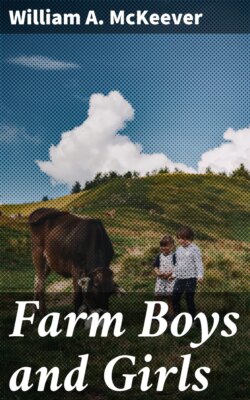Читать книгу Farm Boys and Girls - William A. McKeever - Страница 25
На сайте Литреса книга снята с продажи.
Human rights prior to animal rights
ОглавлениеIf the farmer cannot afford to erect a good barn he may take reasonable care of his horses with the use of a cheap, improvised one. Actual test will show that horses may be made comfortable in the summer time with the use of a straw-thatched shed for a barn, provided the drainage be reasonably good and the earth floor be kept in good order. The thatched covering may be made to keep out the rain. During the winter, with the use of a few slender poles, the entire shed may be inclosed with a hay or straw wall and the place thus be made very satisfactory for the time being. Similar sheds and protection may be provided for the other live-stock, all to await the time when the means are at hand for better conveniences. It is especially suggestive of a mean lack of consideration of human rights in the case of the farmer who has a big, expensive farm barn towering up beside a little dingy shanty of a dwelling house. And yet this thing is all too common, particularly in new prairie regions. Such is the place out of which beastliness and criminality and anarchy tend to be germinated from the lives of boys and girls, to say nothing about the hidden tragedies that surround the lives of the many women who are forced to put up with such an arrangement for half a lifetime.
Just one illustration of a situation of the sort described will suffice to point out the moral. On an occasion two strangers drew up to a farmhouse. One of them was a land agent, and the other a home seeker. Their mission was that of purchasing a farm. The owner of the farm showed them about the place with considerable enthusiasm, but his heart swelled with pride when he reached the magnificent barn, one side of which was devoted to the propagation of a high-grade strain of Duroc Jersey swine. Every convenience and comfort for the hogs was provided. He boasted about his success with them, showed an affectionate regard for the different individuals, calling them by name. The horses, too, might have aroused the envy of the entire neighborhood. They were sleek and well-fed, full in flesh and fair in form. There was provided every convenience for feeding and caring for the horses and the hogs, so that the hired men found the work about the barn exceedingly easy and pleasant.
Then the attention of the visitors was turned to the farmhouse. Yes, it was small and run down and poor, the intention being to build a larger one “some time.” But that same intention was known to have been expressed repeatedly for a period of twenty years past. And where were the boys? Well, that was the trouble, and furnished the excuse for his willingness to sell the place. He simply could not induce the boys to stay there and take an interest in things. Two of them, barely more than boys, had left the home nest in its meanness and degradation and hired out in town. The mother of the boys was living there because she had to, but upon her face were lines of suffering and disappointment and degradation. Yet in the midst of it all, strange to say, the father seemed to blame the boys and their mother for having conspired against the interests of the farm home and plotted to get away. In the course of his conversation he made it somewhat evident that he would have sold out and left sooner had the other members of the family not been so urgent about the matter, and that he was now holding on partly to indulge his spite and feeling of stubbornness in reference to them.
The cheap novels one may pick up depict many a fictitious tragedy. But in the place just described lies the typical scene of thousands of real tragedies during the course of which numberless lives of boys and girls have been wrecked forever,—lives latent with possibilities of goodness and beauty, of mental and moral strength. And then, the bitterness and anguish of soul of the mothers of these lost members of a high humanity—what of that? The silent walls of an untimely grave in many cases closed them in, while much of the memory of their secret suffering lies buried with them.
